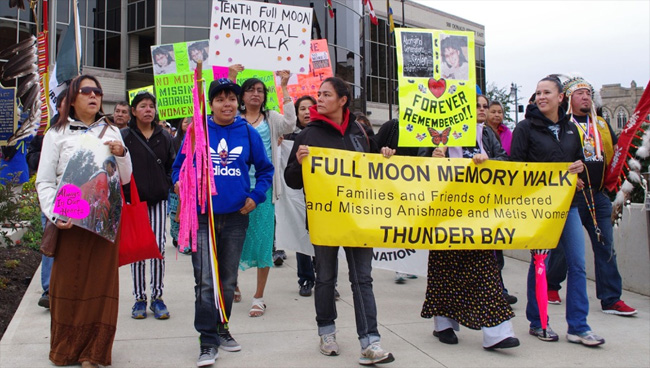Full Moon Memory Walk honours missing and murdered women

By Rick Garrick
THUNDER BAY – Fort William Chief Georjann Morriseau shared her family’s grief and connection to missing and murdered First Nations women during the 10th annual Full Moon Memory Walk.
“My great grandmother was murdered back in the 1930s and was never found,” Morriseau says. “My grandfather, to this day, still never knew who his mother was and has searched to the end of the earth to find who she was and where she is and where she may have been murdered. So it hurts.”
Morriseau encouraged people to raise their children to have respect for others.
“I’m here as a woman and a mother of three little young boys who I am going to do everything I can to instill the most strongest values in them so they know how to treat one another,” says the Chief.
The Full Moon Memory Walk was first held in 2005 and organized by Seine River’s Sharon Johnson over the unsolved murder of her sister Sandra Kaye Johnson in February 1992. The 18-year-old Treaty #3 citizen was found on the frozen Neebing-McIntyre Floodway near Lake Superior the morning after leaving her sister’s home at 1:30 a.m.
“It’s a good feeling to see this many people out here for the walk,” Johnson said during the Sept. 9 walk on the south-east side of Thunder Bay. “It was actually kind of nice to see everybody walking right on the street.”
Johnson appreciated the support of Assembly of Manitoba Chiefs Grand Chief Derek Nepinak, who participated in the walk and stressed the importance of First Nations people standing together and recognizing the issue of missing and murdered First Nations women.
“It’s a systemic problem that is not just confined to one region,” Nepinak says. “It’s a systemic problem within Canadian society, and if we want to see another generation of strong Canadians, we need to overcome some of the challenges that we experience together.”
Morriseau called for a national inquiry into missing and murdered Aboriginal women and girls during the walk, which began with a ceremony and flag raising at City Hall before continuing along Simpson Street, over the Pacific Avenue Bridge and ending near the location where Sandra’s body was found.
“The more we pursue these national inquiries, we push the government to acknowledge the fact that there have been so many stolen sisters,” Morriseau says. “They have been left with no real response and closure to the families.”
An RCMP report issued earlier this year says there have been 1,181 police-recorded incidents of Aboriginal homicides and unresolved missing women investigations over the past 30 years, with Aboriginal women seven times more likely than non-Aboriginal women to become victims of homicide.
“An inquiry is long overdue,” says Thunder Bay–Superior North MP and Green Party of Canada deputy leader Bruce Hyer. “We can’t keep ignoring the connections between these acts of violence committed against Aboriginal women and girls. We owe it to the victims and their families to use every tool we have to investigate this serious problem and solve it, before even more women are put at risk. The government must act now and open an inquiry.”


